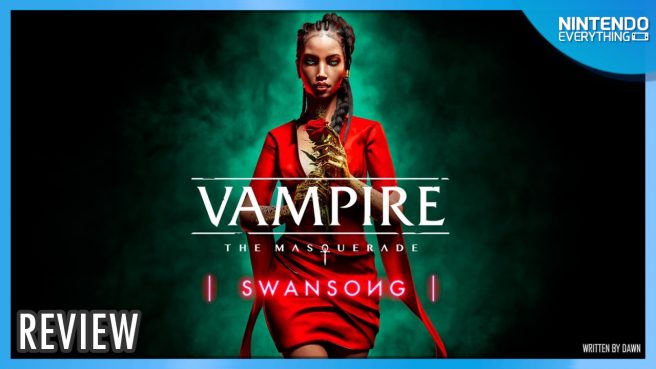System: Switch
Release date: September 28, 2023 (Europe) / December 5 (North America)
Developer: Big Bad Wolf
Publisher: Nacon
Vampire the Masquerade is a series that has been around for a surprisingly long time, lurking in the shadows of tabletop roleplaying games since the early 90s as part of the larger World of Darkness series. It has been adapted into video game format a few times over the years, and Vampire: The Masquerade – Swansong is the third of these games to come to Nintendo’s console. Unfortunately, it has not been worth the extremely long wait, and is something I wouldn’t recommend to even the most avid fans of the series.
Swansong’s story is told from the perspective of three vampires – Emem, Leysha, and Galeb – who have been summoned by the Prince of the Boston Court to investigate in the aftermath of a disaster that occurred at a party to mark an alliance with the Hartford Chantry. Each one is given their own tasks to complete to unravel the truth behind the mystery, and the story swaps between them as their paths diverge. The game has some flexibility initially by allowing you to choose the order you experience the three protagonists’ stories in, but it can be difficult to keep track of what is happening and when as it jumps erratically between them – often at the worst possible moments; this game has a love of cliffhangers which I felt were never really justified when the story picked back up again – and disappointingly, they never really converge together for a satisfying conclusion. There is some crossover between the three at points during the story, but Swansong feels more like three separate storylines that started as a result of an event that was more interesting than what is presented in the game.
Your ability to follow along is also going to depend quite heavily on your familiarity with Vampire: The Masquerade, because the game pulls no punches with its jargon. Swansong does its best to bring those unfamiliar with its world into the fold without disrupting the pace of the narrative via an extensive codex, which I felt is an acceptable compromise, but for newcomers there is a lot to take in, and unfortunately most of it is required reading to understand the particulars. Without that background knowledge Swansong’s narrative is extremely dry and tedious, and the pacing remains tepid throughout. Despite the atrocities that serve as the backdrop for the story it feels (if you’ll pardon the pun) very low stakes, and the characters often seem almost bored by the whole affair, with stilted and archaic dialogue complimenting the setting, but failing to establish the right tone to pull you into the conflict and drama.
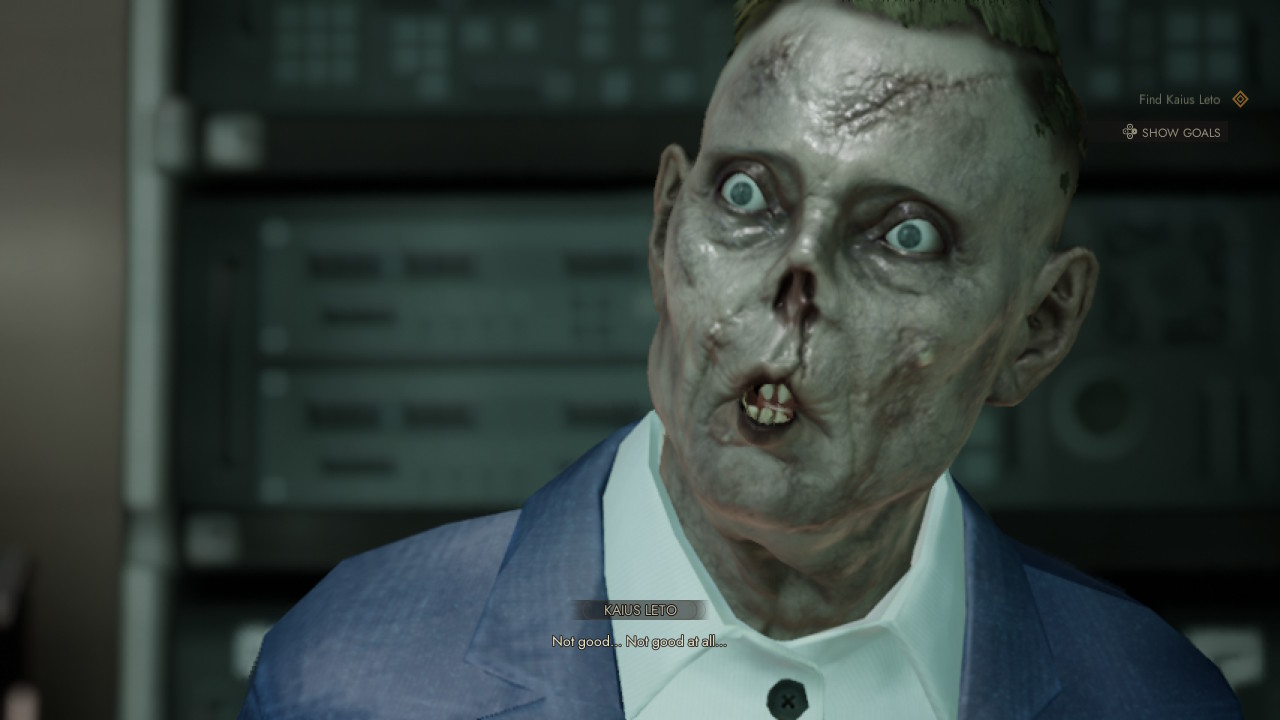
Fans of Vampire the Masquerade will no doubt enjoy Swansong more than those unfamiliar with the series, because despite its slow and often frustrating pacing, its underlying politics fit in well with the franchise. The three protagonists all bring something unique to the table thanks to their varying backgrounds and personalities, and even though their stories never converge in a satisfying way, they are all quite different from one another. There is enough detail in the setting here to pull you in and keep you invested if you take the time to do the required reading to fully comprehend everything that’s going on. A lot of this is due to the rich and well-established lore of Vampire the Masquerade, however, and not Swansong’s contribution to it.
Swansong is a narrative-driven RPG, where NPC interaction and multiple choice dialogue moves the gameplay forward. You’ll control one of the three protagonists as they undergo their missions, advancing the story by discovering clues hidden in the surrounding area and using the knowledge gained from these to interact with the NPCs and manipulate the situation to your advantage. At the end of each character’s scene you’ll be given a summary of what you did and things that you could have done but missed out on.
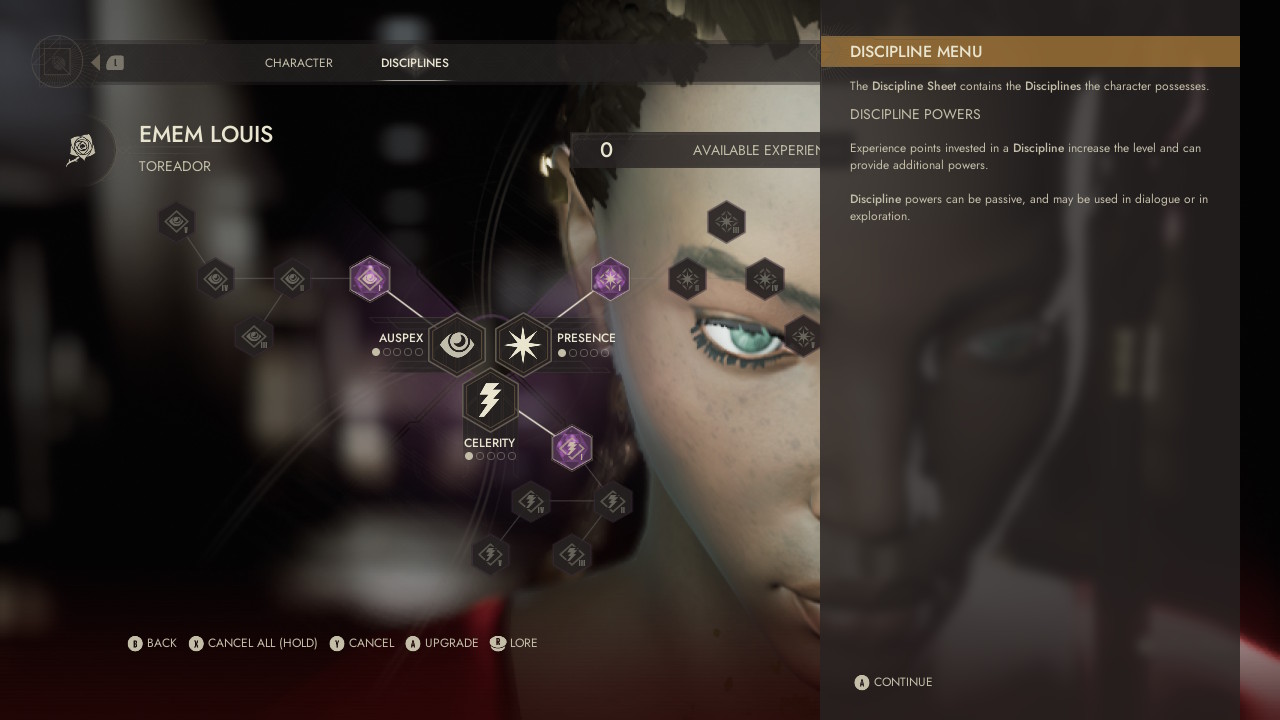
Character customization is quite extensive in Swansong, and you can invest experience points gained through successful dialogue and completion of mission objectives into a large number of different abilities. Every character can invest in Attributes and Skills, which open new dialogue options and reduce their Focus cost, letting you select choices that rely upon them more often in conversations when they appear. Once you run out of Willpower, you’re unable to continue selecting those options, unless you restore it through successful dialogue options (which creates a potentially problematic situation: the dialogue choices dependent on Willpower are generally the ones that are more successful and more likely to restore it) or a consumable item, which are extremely hard to come by. This adds a level of unpredictability which I found to be quite enjoyable as it made me consider my options more carefully, but it’s also quite frustrating to invest in attributes and still be unable to pass the skill checks. Many choices that will affect the course of the story in more significant ways are also largely unaffected by your character’s stats, making the whole system feel superfluous at best.
The gains you get from investing in these are also quite small for the amount of experience they cost, and unless you invest heavily in a single area you won’t necessarily see any benefit from it. You’re given the option to pick between three pre-made specializations at the start of the game, which would have provided a useful template for character building if the various systems were explained sufficiently in the game. Although Swansong bundles its jargon into its codex, it does not do the same for its tutorials, giving you very brief explanations at the start of the game and assuming you’ll be able to retain and apply that information to get the outcomes you desire.
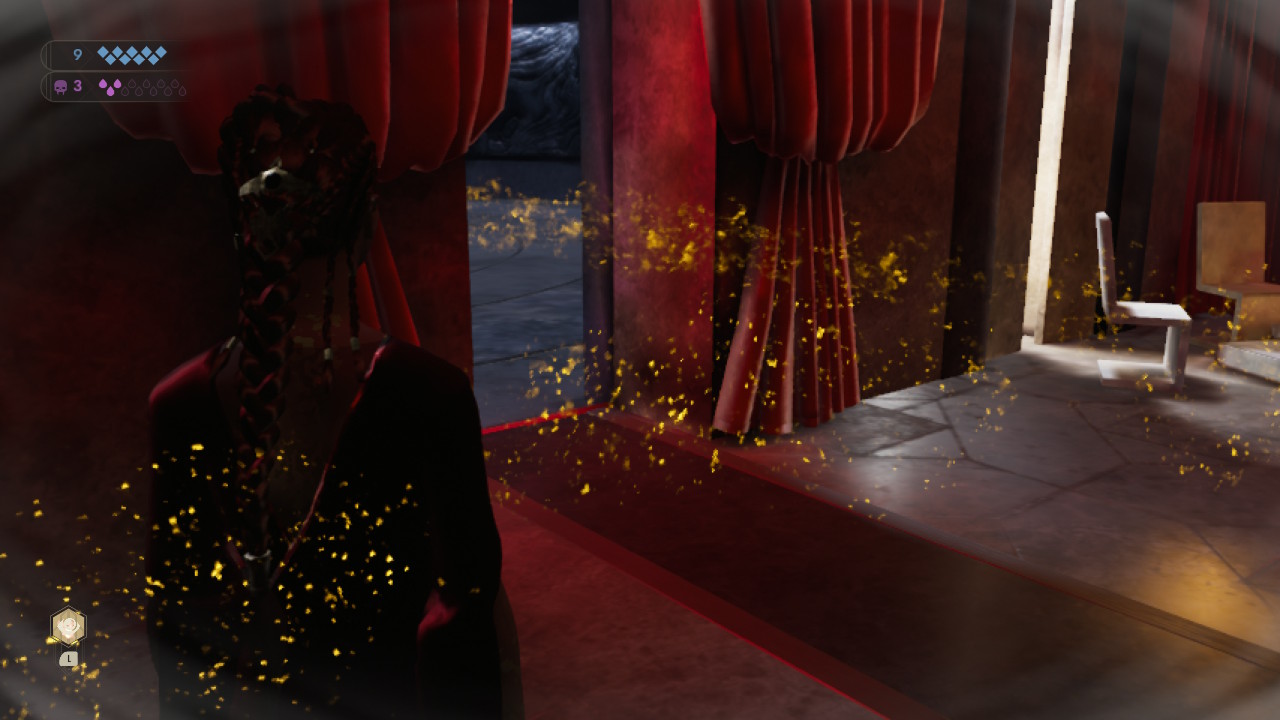
Each character has their own unique set of Disciplines that they can invest in. I found using these to be the most enjoyable part of the game, as they made each character feel distinct and also introduced different elements to the gameplay. Leysha’s ability to copy the appearance of other characters was a highlight, because it allowed access to different areas and prompted different reactions from NPCs depending on who she was currently disguised as. Using Disciplines builds up Hunger, which will cause you to lose control once it reaches a certain level; usually this involves tearing out the throat of the closest person, arousing suspicion and generally making life more difficult. To help you manage your hunger there are safe zones scattered about the area, which you can lead specific NPCs to so that you can drain their blood, although you can also accidentally kill them if you drain too much, adding another factor to consider.
The most pivotal element of dialogue is Confrontations, where you’ll engage in longer, more story significant interactions with NPCs, and will need to select the correct dialogue choice or suffer the consequences. You’re normally allowed to fail once or twice, and these have an element of drama to them which makes them more entertaining than your standard interactions, but I often found them to be more frustrating than enjoyable due to how vague they were. In most conversations choices are more nuanced, but in Confrontations there is often a binary “right” and “wrong” choice to make, and there is rarely any indication of what this is in the dialogue. Options are also locked behind higher than average skill checks, which makes longer Confrontations more awkward to manage as your resources are limited. If you’re not allowed to fail even once it feels quite poorly designed, particularly in a game where your choices matter.
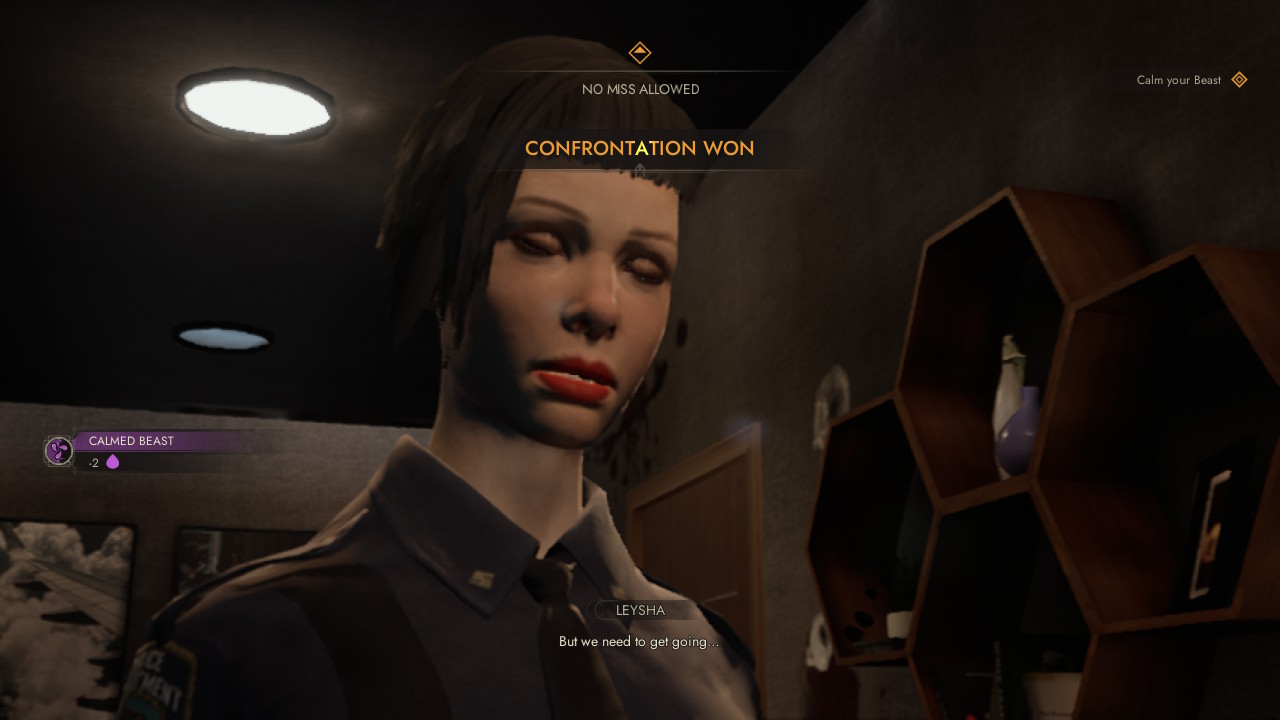
There are only a handful of endings and outcomes (generally if certain characters live or die, or the actions of factions you’ll interact with) that you can influence directly, and these are often choices where the dialogue options are not determined by Attributes or Skills. Although the character building system is robust, I felt that it was under-utilized, and I never really felt as though my actions were having a large impact upon proceedings, or that I had enough experience to allocate into the various skill trees for it to have a significant impact, especially considering the same experience points are also used to improve your Disciplines.
Swansong is also let down significantly by its visuals, which are unpolished at best and make the game unplayable at worst. Textures alternate between being a blurred mess to a jagged and pixelated nightmare, transitioning mid-scene from one to the other at the slightest provocation. The visual effects from your protagonists’ vampiric abilities during gameplay either add to the scenery clutter or make the distortion already present even more prominent, making navigating the world a trial. Much of the gameplay not spent making dialogue choices is spent hunting for clues in the environment, and I found that this element was stripped of a lot of its fun because it was practically impossible to see what I was supposed to be looking at. Markers that depict something you can interact with are very difficult to see when objects are an indistinguishable jumble that doesn’t get noticeably clearer regardless of how close you are to them.
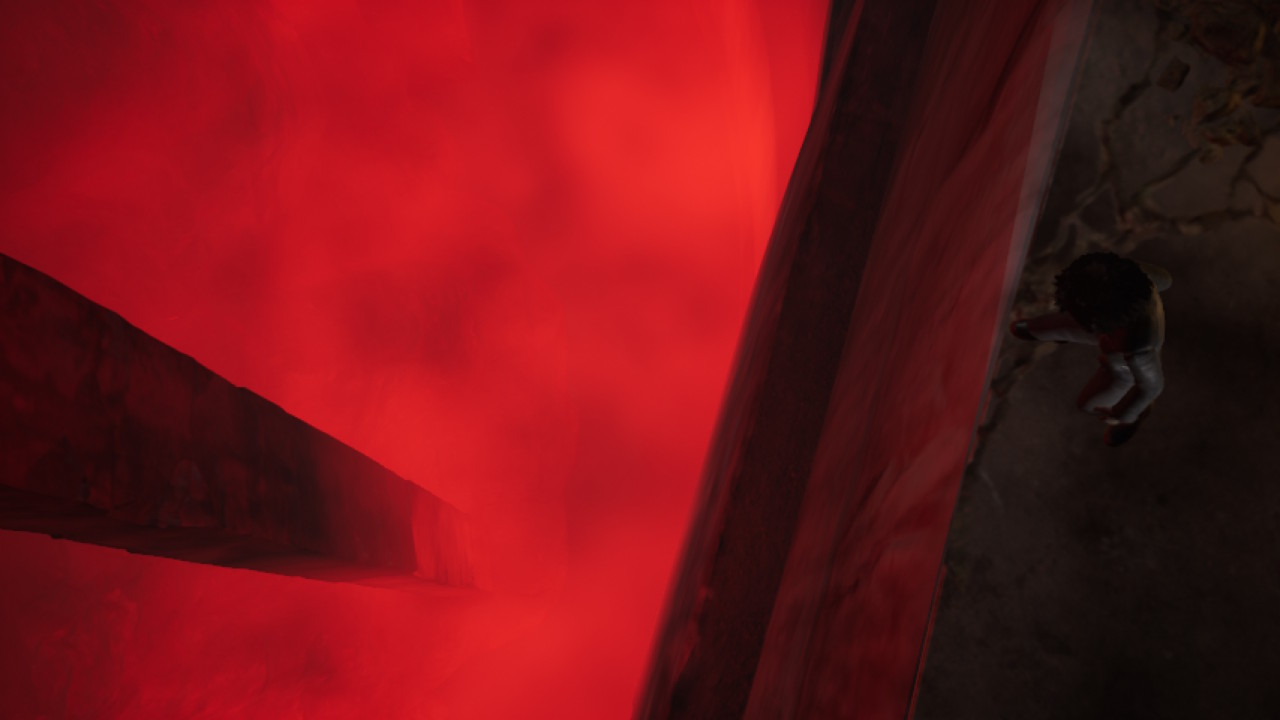
As you might expect, Swansong is a very dark game with a lot of oppressive shadow effects, and although this disguises a lot of the game’s uglier and unpolished assets and helps to create an atmosphere that complements the game’s themes and story, without adjusting the brightness several levels it becomes almost impossible to see what you’re doing at all in handheld mode in some places, putting you in the very awkward position of needing to choose between being able to see what you’re doing with unattractive visuals or squinting into the dark and just pretending it’s all a part of the ambience. Visuals do not improve noticeably on a TV screen either; if anything, the lack of polish becomes even more prominent.
Character animations are stiff and awkward, and they shuffle about like poorly controlled string puppets, with exaggerated facial expressions (or in some cases a complete lack thereof) to match. There are occasional skips in animation that make them move at higher speeds, and it’s all too easy to get stuck on doors or steps, both for your controlled character and for NPCs. Performance is similarly choppy, and there are frequent frame drops or long pauses, particularly when initiating dialogue with NPCs or entering cutscenes. Loading times can be quite long, and more than once I thought my console had actually stopped working as it took over a full minute to load into the game. However, I never experienced any crashes, and the UI is also clean and easy to navigate, although the on-screen text is quite small in handheld mode and can be very difficult to make out against the game’s backgrounds.
The Verdict

Vampire: The Masquerade – Swansong is a mess. The game has some interesting ideas with its character building systems, although it ultimately fails to implement them in any satisfying way into its narrative, and any immersion that can be gained from the game’s setting is constantly disrupted by its appalling visuals and generally poor performance. Even if you’re a fan of the series this is not a game that you should be considering picking up on the Switch, and for those who are unfamiliar with Vampire: The Masquerade, this is definitely not the place to begin your sojourn into the World of Darkness. Some things are better off left concealed in the shadows.
Vampire: The Masquerade – Swansong copy provided by the publisher for the purposes of this review.
